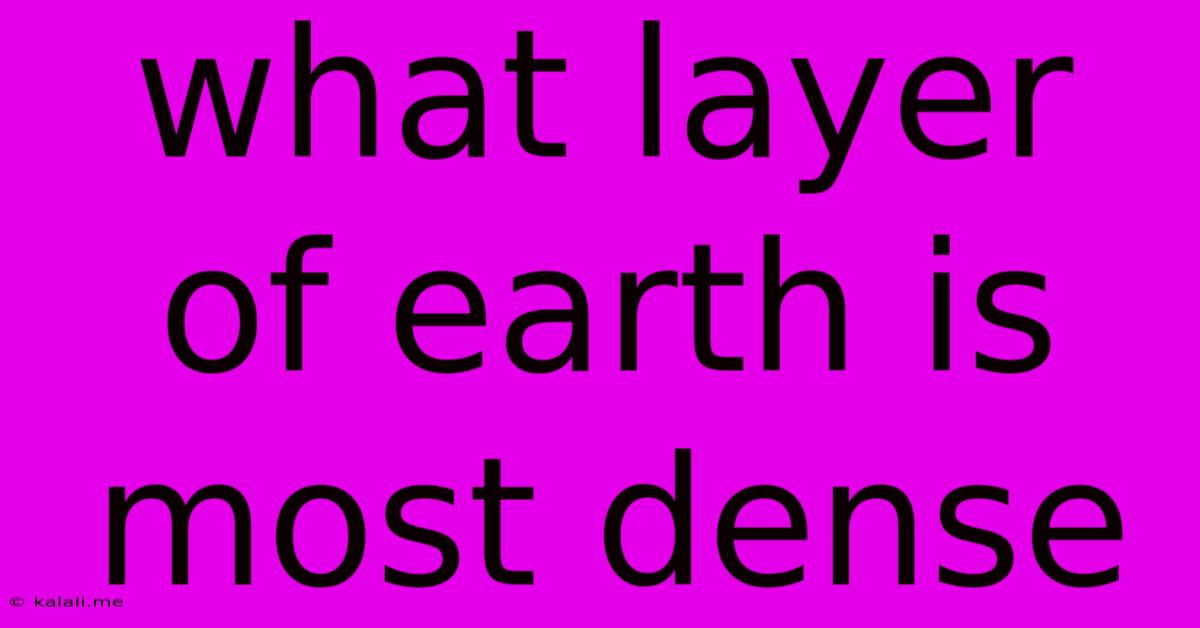What Layer Of Earth Is Most Dense
Kalali
May 09, 2025 · 3 min read

Table of Contents
What Layer of the Earth is Most Dense? Delving into the Earth's Interior
The Earth isn't a uniform sphere; it's a complex system with distinct layers, each possessing unique properties. One of the most fascinating aspects of our planet is the variation in density across these layers. So, which layer boasts the highest density? The answer is the Earth's inner core. This article will explore why, examining the composition and conditions of each layer.
Understanding the Earth's density profile is crucial for comprehending various geological phenomena, from plate tectonics to magnetic field generation. We'll look at the key characteristics of each layer to understand why the inner core takes the density crown.
Exploring the Earth's Layered Structure
The Earth is broadly divided into four main layers: the crust, mantle, outer core, and inner core. Each layer differs significantly in composition, temperature, and pressure, all of which influence density.
-
Crust: The outermost layer, relatively thin and composed primarily of silicate rocks. This layer is least dense due to its lighter elements. Oceanic crust is denser than continental crust due to differences in composition.
-
Mantle: A much thicker layer beneath the crust, primarily composed of silicate rocks rich in iron and magnesium. The mantle's density increases with depth due to increasing pressure. This increase in density is gradual compared to the dramatic shift at the core-mantle boundary.
-
Outer Core: A liquid layer composed mainly of iron and nickel. The high temperature in this region prevents the formation of solid iron. The density is substantially higher than the mantle due to the presence of heavier elements, and the fluid nature of the layer allows for convection, which drives the Earth's magnetic field.
-
Inner Core: The Earth's most dense layer, this solid sphere is composed primarily of iron and nickel, but under immense pressure and temperature. The incredibly high pressure forces the iron and nickel atoms closer together, resulting in the highest density of all the Earth's layers. Think of it as a giant, intensely compressed iron-nickel ball.
Why is the Inner Core the Densest?
The exceptionally high density of the inner core is a direct consequence of two factors:
-
Composition: The predominant presence of iron and nickel, which are inherently denser elements than those composing the mantle and crust, is a primary contributor.
-
Pressure: The immense pressure at the Earth's center forces the iron and nickel atoms incredibly close together, significantly increasing the density. This pressure is many millions of times greater than the pressure at the Earth's surface.
The combined effect of these two factors results in a density significantly higher than any other layer, making the inner core the densest part of our planet.
Further Research and Implications
The study of the Earth's interior continues to be a vibrant field of research. Advanced seismological techniques, coupled with sophisticated computational models, are constantly refining our understanding of the density variations and the processes occurring within the Earth. This knowledge is essential for comprehending various aspects of our planet, including its geological history, the generation of the magnetic field, and predicting potential hazards like earthquakes.
Understanding the density differences between the Earth's layers helps scientists develop more accurate models of Earth's internal dynamics. Future discoveries in this field will further refine our understanding of our planet and its evolution.
Latest Posts
Latest Posts
-
Convert 3 Degrees Celsius To Fahrenheit
May 10, 2025
-
Is Melting Of Ice A Physical Change
May 10, 2025
-
120 Is What Percent Of 300
May 10, 2025
-
Cuanto Es 25 Metros En Pies
May 10, 2025
-
What Is 6 To The Zero Power
May 10, 2025
Related Post
Thank you for visiting our website which covers about What Layer Of Earth Is Most Dense . We hope the information provided has been useful to you. Feel free to contact us if you have any questions or need further assistance. See you next time and don't miss to bookmark.